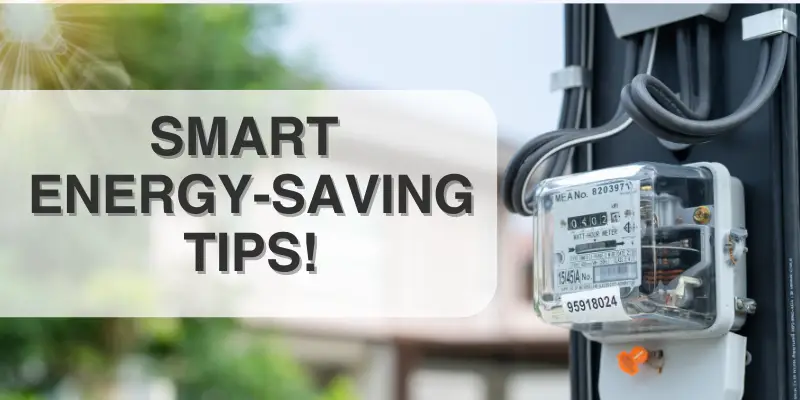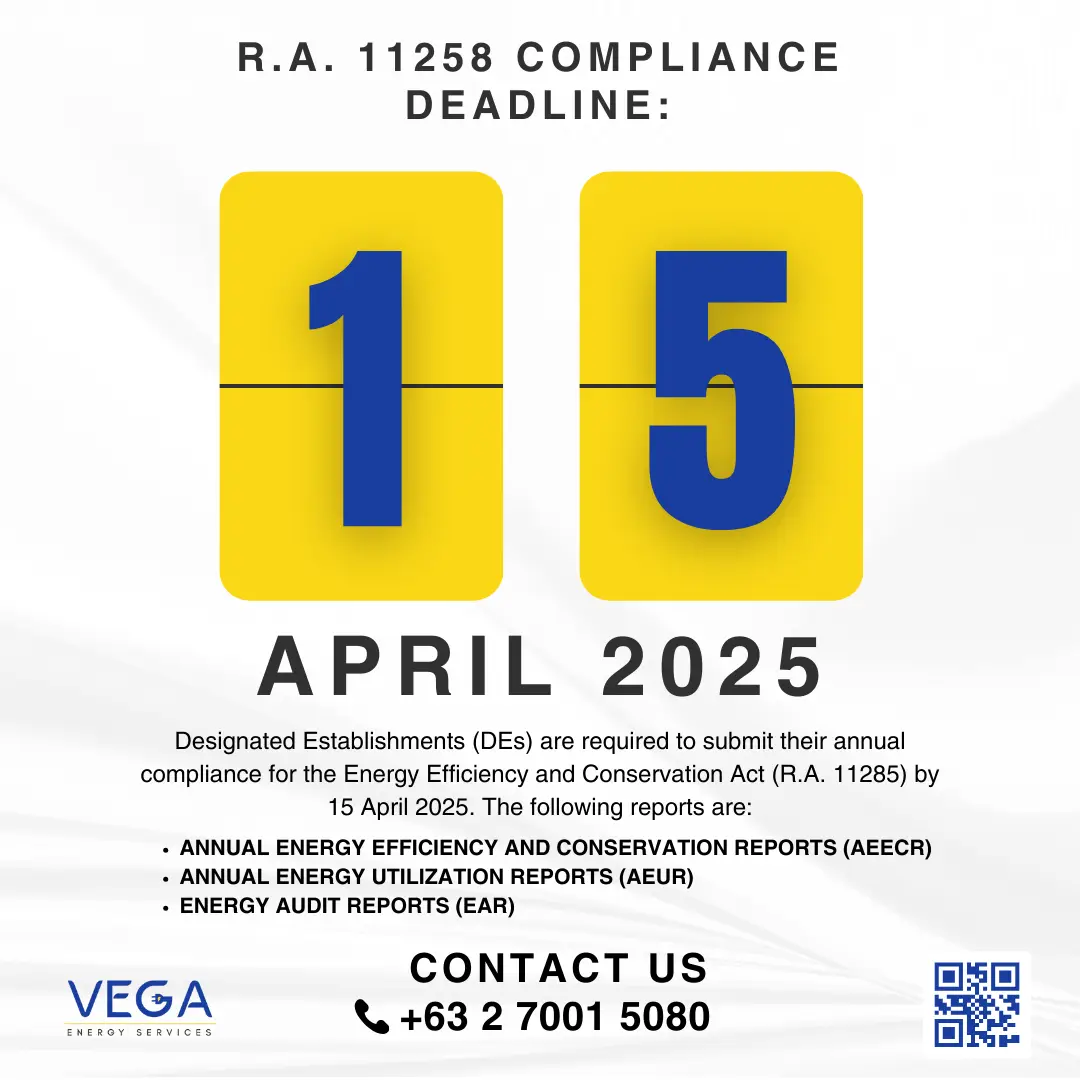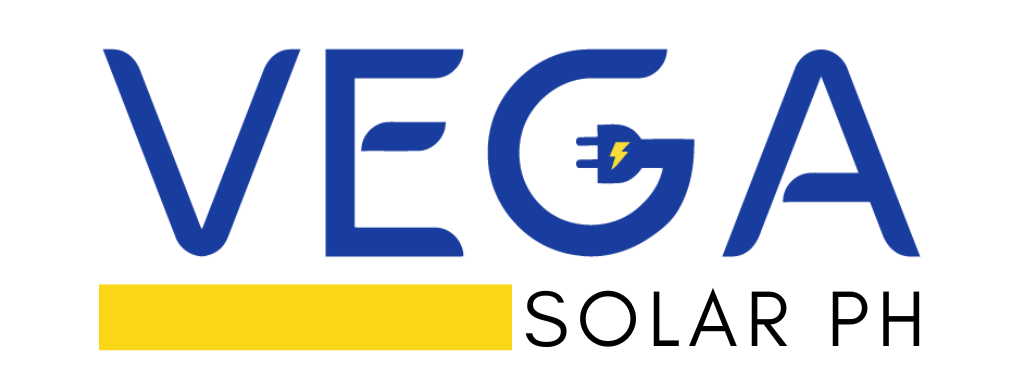Whether you are from a government entity, an energy end-user, a service provider, or just a curious individual, it is important to be familiar with the different policies in place to maximize the Energy Efficiency and Conservation (EE&C) opportunities in your organization without compromising any legal compliance. Vega Energy compiled below a list of such policies to help our clients understand better the energy efficiency field in the Philippines:
Republic Act No. 11285 : Energy Efficiency and Conservation Act of 2019
RA 11285, signed on April 12, 2019, is an Act institutionalizing Energy Efficiency and Conservation, Enhancing The Efficient Use of Energy, and Granting Incentives to Energy Efficiency and Conservation Projects.
This law aims to maximize the EE potential in the country by establishing a framework to institutionalize fundamental EE&C policies and to improve the energy performance of different sectors. It requires the active participation of the Government as the driver of the Act and the role model; the Energy End-Users to monitor and report their energy performance, implement EE measures, and utilize alternative sources of energy; and the Service Providers to perform services that are aligned with the professional standards and requirements of the Act and other related issuances. It also requires all manufacturers, importers, distributors, and retailers of energy-consuming products to comply with the products’ Minimum Energy Performance (MEP) and Energy Labels as prescribed by the Department of Energy. Lastly, the granting of Incentives to EE&C Projects is also given priority in this Act.
Energy Efficiency and Conservation Act (RA 11285) – Implementing Rules and Regulations (EEC-IRR) – DOE Department Circular No. DC 2019-11-0014
Signed on November 22, 2019, the EEC-IRR establishes a framework for introducing and institutionalizing fundamental policies on energy efficiency and conservation, including the promotion of efficient and judicious utilization of energy, increase in the utilization of energy efficiency and renewable energy technologies, and the delineation of responsibilities among various government agencies and private entities.
Below are the supporting Department of Energy (DOE) Department Circulars/Orders, Memorandum Circulars/Orders, and other Issuances relevant to the different stakeholders and features of RA 11285:
Government
- The Department of Energy, particularly the Energy Utilization Management Bureau (EUMB) and being the lead agency to promote and implement RA 11285, was reorganized in four divisions namely:
- Alternative Fuels and Energy Technology Division (AFETD)
- Energy Efficiency and Conservation Program Management and Technology Promotion Division (EPMPD)
- Energy Efficiency and Conservation Public Sector Management Division (EPSMD)
- Energy Efficiency and Conservation Performance Regulation and Enforcement Division (EPRED)
The guidelines and specific mandates of each division are further stated in the DOE Department Order No. 2020-01-0002 : Operationalization of the Strengthening of the Energy Utilization Management Bureau (EUMB), Support Services and Field Offices on Accordance to Republic Act No. 11285 or the Energy Efficiency and Conservation Act (EEC Act) and DOE Department Order No. 2020-06-0008 : Guidelines on Reassignment of DOE Personnel not from EUMB who have signified Interest to be Part of the Strengthened or Reorganized EUMB.
Furthermore, an Energy Management Team (EMT) shall be established to effectively implement RA 11285 and for DOE to continuously improve its energy performance. This is mandated in DOE Department Order No. 2023-01-0001 : Institutionalizing the Energy Management Team (EMT) to Develop an Energy Management System (EnMS).
- Pursuant to Section 35 of the IRR of RA 11285, an Inter-Agency Energy Efficiency and Conservation Committee (IAEECC) is created to evaluate and approve government energy efficiency projects, and to provide strategic direction in the implementation of the Government Energy Management Plan (GEMP). Further details of IAEECC can be found in the DOE Department Order No. 2020-01-0001 : Organizing the Inter-Agency Energy Efficiency and Conservation Committee.
Furthermore, the guidelines on the endorsement of such energy efficiency projects to IAEECC can be found in DOE Department Order No. 2022-04-0006 : Guidelines on the Endorsement of Government Energy Efficiency Projects to the Inter-Agency Energy Efficiency and Conservation Committee Pursuant to the Government Energy Management Program Guidelines.
- Organization for Economic Co-operation and Development (OECD) through the Clean Energy Finance and Investment Mobilization (CEFIM) Programme aims to mobilize clean energy investments that are comprised of Energy Efficiency and Renewable Energy projects. A special steering committee and working groups are created to support and strengthen the objectives of CEFIM Programme. The details of these groups can be found in DOE Department Order No. 2022-02-0003 : Creation of a Philippine Steering Committee (PSC) and Technical Working Groups (TWG) for Renewable Energy (RE) and Energy Efficiency and Conservation (EE&C) Under the Clean Energy Finance and Investment Mobilization (CEFIM) of OECD
- Pursuant to Section 6 of RA 11285, other government agencies have a role to play in the successful implementation of the Act, thus, the following agencies have already created some guidelines to support the implementation:
- Department of Interior and Local Government (DILG)
- DILG Memorandum Circular No. 2020-082 : Guidelines in Implementing RA No. 11285 or the “Energy Efficiency and Conservation Act” and its IRR, For All Provincial Governors, City Mayors, Municipal Mayors, DILG Regional Directors, BARMM Minister for Local Government, and others concerned
- Department of Public Works and Highways (DPWH)
- DPWH Department Order No. 234 Series of 2022 : Implementation of Republic Act 11285 re: Energy Efficiency and Conservation Act
- National Electrification Agency
- NEA Memorandum No. 2020-042 : Compliance to Republic Act No. 11285 or the “Energy Efficiency and Conservation Act” and its Implementing Rules and Regulations, for all Electric Cooperatives
- NEA Office Order No. 2021-82 : Energy Efficiency and Conservation Committee and the Energy Conservation Team
Energy End-Users
- Energy End-Users classified as Designated Establishments are required to submit an Annual Energy Utilization Report mandated by RA 11285, the guidelines of which are stated in this DOE Memorandum Circular No. 2020-05-0001 : Directing All Designated Establishments under Commercial, Industrial and Transport Sectors to Submit Energy Consumption Reports.
- Section 5 of DOE Department Circular No. 2021-01-0001 : Guidelines for the Qualifications, Assessments, Registration, and Certification of Energy Conservation Officers CECO), Energy Managers (CEM), and Energy Auditors (EA) states the Responsibilities of CECO and CEM in their respective Designated Establishments.
Certifications
- Pursuant to Department Circular No. 2008-09-0004 dated 24 September 2008 and in order to facilitate the processing and accreditation of Energy Service Companies (ESCOs) in the Philippines, the Committee on the Accreditation of ESCOs is hereby created to be composed of the following DOE personnel stated in the DOE Department Order No. 2019-07-0013 : Constituting the Committee on the Accreditation of Energy Service Companies (ESCOs).
- On September 9, 2020, DOE released the Department Circular No. 2020-09-0018 stating the Guidelines in the Administration, Classification and Certification of Energy Service Company (ESCO). It then came into effect on October 9, 2020.
- For Designated Establishments and Individuals who want to know the guidelines on how to obtain the certifications on CEM, CECO, and CEA, you may access the DOE Department Circular No. 2021-01-0001 : Guidelines for the Qualifications, Assessments, Registration, and Certification of Energy Conservation Officers CECO), Energy Managers (CEM), and Energy Auditors (EA).
- On the other hand, the following department circulars provide information on Training Regulations and Prescribed Certification Process for CECO, CEM and CEA. These are especially useful for those who want to become Registered Training Institutions (RTI) accredited by the DOE.
- DOE Department Circular No. 2022-03-0006 : Adoption of Training Regulations [and Prescribing] Certification Process for Energy Auditors (EAs)
- DOE Department Circular No. 2022-03-0007 : Adoption of Training Regulations for the Certification of Energy Conservation Officers (ECOs)
- DOE Department Circular No. 2022-03-0008 : Adoption of Training Regulations and Prescribing Certification Process for Training Institutions and Energy Managers (EMs)
Energy Performance and Energy Labeling
- DOE Department Circular No. 2020-06-0016 : Prescribing the Minimum Energy Performance for Products (MEPP) covered by the Philippine Energy Labeling Program (PELP) for Compliance of Importers, Manufacturers, Distributors, Dealers and Retailers of Energy-Consuming Products
- DOE Department Circular No. 2020-06-0015 : Prescribing the Guidelines of the Philippine Energy Labeling Program (PELP) for Compliance of Importers, Manufacturers, Distributors and Dealers of Electrical Appliances and other Energy-Consuming Products (ECP)
- DOE Department Circular No. 2020-10-0023 : Prescribing Policy Framework for the Development of the Fuel Economy Rating, Fuel Economy Performance, and Related Energy Efficiency and Conservation Policies for the Transport Sector and other Support Infrastructures
- DOE Department Circular No. 2020-12-0026 : Adoption of the Guidelines on Energy-Conserving Design of Buildings
- DOE Department Circular No. 2022-03-0005 : Guidelines for the Recognition of Testing Laboratories for the Examination, Testing and Verification of the Energy Efficiency of Energy-Consuming Products (ECPs) and the Fuel Efficiency of Transport Vehicles, Including the Issuance of Certificate of Endorsement to the Board of Investments (BOI) for Fiscal Incentives
- DOE Department Circular No. 2021-07-0023 : Providing a Policy Framework on the Guidelines for the Development, Establishment, and Operation of Electric Vehicle Charging Stations (EVCS) in the Philippines
- DOE Department Circular No. 2022-11-0035 : Expanding the Coverage of the Philippine Energy Labeling Program (PELP) for the Compliance of Importers, Manufacturers, Distributors, Dealers and Retailers of Energy Consuming Products (ECPs)
Incentives
- DOE Department Circular No. 2022-03-0004 : Guidelines for the Endorsement of Energy Efficiency Strategic Investments to the Board of Investments for Fiscal Incentives
- DOE Department Circular No. 2021-05-0011 : Guidelines for the Endorsement of Energy Efficiency Projects to the Board of Investments for Fiscal Incentives
- Pursuant to Section 26 of RA 11285, establishments that will implement or are implementing energy efficiency projects shall be entitled to Awards and Recognition the guidelines of which are stated in the DOE Department Order No. 2021-09-0014 : Guidelines on Energy Efficiency Excellence Awards.
References:
- Philippine Department of Energy website accessed via doe.gov.ph
- Official Gazette website accessed via officialgazette.gov.ph
- Department of Interior and Local Government (DILG) Guidelines in Implementing RA No. 11285 accessed via https://dilg.gov.ph/issuances/mc/Guidelines-in-Implementing-RA-No-11285-or-the-Energy-Efficiency-and-Conservation-Act-and-its-IRR/3207
- Department of Public Works and Highways (DPWH) Implementation of Republic Act No. 11285 re: Energy Efficiency and Conservation Act accessed via https://www.dpwh.gov.ph/dpwh/issuances/department-order/28473
- National Electrification Agency website accessed via nea.gov.ph
- Philippine Energy Efficiency Alliance (PE2) website accessed via pe2.org





